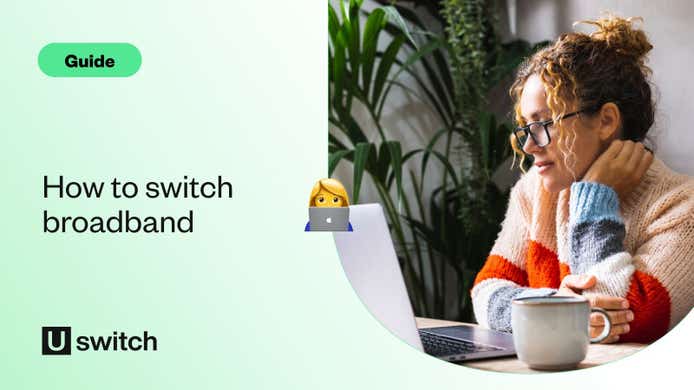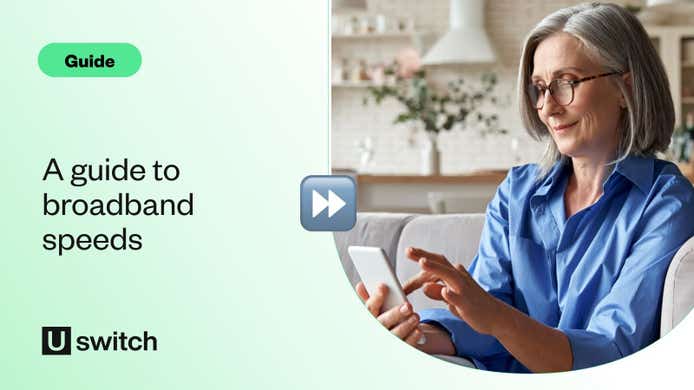Broadband connections are getting faster each year and the next step in home broadband is the jump to gigabit speeds.
With superfast speeds up to 70Mbps available to 98% of the country, the majority of UK households are able to get decent internet speed at home. But nowadays more than 80% of UK homes can also get access to full fibre or Virgin Media broadband, which provide speeds of 1,000Mbps or more with gigabit internet.
Gigabit internet explained
Gigabit internet delivers download speeds of around 1Gbps, the equivalent of 1,000Mbps.
These kinds of speeds are typically only available in locations with fibre-to-the-premises (FTTP), commonly known as ‘full fibre’ connections, or areas covered by Virgin Media's network.
However, the biggest difference between full fibre and cable gigabit internet is the significant difference between their upload and download speeds. Upload speeds with Virgin Media are relatively low compared to what's capable with full fibre, where they're sometimes equal to the download speed.
83% of all UK homes have access to gigabit-capable broadband
*according to Ofcom in December 2024
Can I get gigabit broadband?
Gigabit-capable broadband connections are continually increasing across the UK, with over 22 million homes (75%) now able to access these top-end speeds.
| Access to gigabit-capable services | May 2023 | September 2023 | April 2024 (interim update) | December 2024 |
|---|---|---|---|---|
| UK | 75% | 78% | 80% | 83% |
| England | 76% | 78% | N/A | 84% |
| Northern Ireland | 91% | 92% | N/A | 94% |
| Scotland | 69% | 72% | N/A | 77% |
| Wales | 60% | 64% | N/A | 74% |
You can see more stats and information about internet access across the UK on our broadband statistics page.
Compare broadband deals over 100Mbps
Browse our range of broadband deals over 100Mbps, including a number of gigabit offers.
What can I do with gigabit internet speeds?
Obviously the higher your download speed, the faster you can download files and the better quality you can stream smoothly, and gigabit internet offers speeds ten times faster than average superfast broadband.
There are a few key instances when this incredible speed can be incredibly useful.
Streaming video
The largest files most of us use each day are video files, and so streaming video, whether that’s Netflix, YouTube or Disney Plus, is where you’ll see some of the most noticeable increases in performance when you have gigabit internet. This is especially true when streaming in 4K, which uses four or five times as much bandwidth as streaming in HD – aka 1080p.
By itself, 4K streaming shouldn’t be a problem for most superfast fibre broadband connections, the problem comes when there are multiple users in one household. With two or three people using 4K devices in your home, even a 100Mbps connection can get clogged up pretty quickly, leaving not much bandwidth for anything else.
So if you have a household full of devices, gigabit internet is sure to give you plenty of spare bandwidth no matter who’s streaming what.
Online gaming
Online gaming with gigabit internet
There are few things more frustrating when gaming online than a bad ‘lag’. This is the time between you making your move on the controller and seeing it on the screen. Those that receive their gigabit internet via a full fibre connection will have similar upload and download speeds and often won’t have to worry about slow ping rates or weak connections.
Another benefit of getting gigabit internet via full fibre is that, with your upload speeds matching your downloads, you can stream your gameplay much more smoothly on platforms like Twitch.
Immersive media
Immersive media
Taking media one step beyond streaming and gaming, immersive media, such as 360-degree video and VR is quickly becoming more popular and could greatly benefit from gigabit internet. Faster download and upload speeds, as well as dramatically-reduced latency, will mean a smoother, more realistic experience in immersive digital environments.
Working from home
Working from home
Those of us who have swapped our office chairs for sofas quickly realised that our home broadband was no match for some of our daily work requirements. Sending and receiving large files, uploading high-resolution images or videos, all the usual tasks you could perform in seconds on the work Wi-Fi that you took for granted.
Gigabit internet reduces the strain on your home network and leaves you with plenty of bandwidth for other members of your household to get on with Zoom calls, home workouts and Netflix binge sessions
Cloud-based storage
Traditional methods of backing up data such as local storage and external hard drives are vital for data-heavy files like videos and high-resolution images, but cloud-based storage services have quickly become the new norm. Services like Google Drive and Dropbox give you access to your files wherever you are, and make automatic backups a breeze.
With gigabit internet, using cloud-based storage could be just as quick as using a USB stick or an external hard drive. For more tech-savvy users, you might even want to consider setting up your own server, which can provide huge amounts of storage that can be accessed via online platforms whenever you need it.
Sign up for our latest broadband offers and expert advice
Get more expert insights, browse our latest exclusive offers and find money-saving deals from Uswitch.
Is gigabit broadband worth it?
Gigabit speeds are impressive and the thought of downloading files in seconds can be tempting, but there are times when gigabit internet isn’t worth the additional cost.
If you have a slow home network
Gigabit internet is great, but if your home network isn’t capable of handling those speeds then you won’t see the benefit. You should receive a gigabit-capable router and modem from your provider when you switch, but it’s worth double-checking.
If you have old technology
If you’re using old devices, you won’t see the benefit of gigabit internet speeds. This is especially true with wireless broadband, where devices connected over Wi-Fi tend to top out at 300Mbps.
Do a quick inventory of your home technology — if everything is brand-new then you’ll be fine, but if you’re using slightly older tech then you might want to upgrade your gadgets before you upgrade your broadband.
If you don’t have a wired connection
Possibly the biggest twist is that gigabit internet speeds are only really achieved with wired connections. Even with a mesh network, if the devices are connected to each other wirelessly it will cut your effective speed in half. If all your devices connect to the internet via Wi-Fi then you probably won’t notice any difference between 500Mbps and gigabit speeds.
If you don't need it
Gigabit broadband deals are the most expensive ones on the market. So if you need to keep your costs low, a cheaper broadband deal that offers slower speeds would probably be a more sensible decision.
That doesn't mean you'll be stuck with a slow speed — superfast fibre broadband deals now come almost as cheap as copper ADSL ones — but it will mean you can be a lot more comfortable with your monthly outgoings.
Which providers offer gigabit internet?
Several of the best internet providers are investing in their fibre networks, meaning gigabit internet will slowly become more available in the months and years to come. However, at the moment, 1Gbps speeds are limited to a few key locations, and each of these locations is usually supplied by just one provider at the moment.
For instance, Hyperoptic has some gigabit internet availability within London postcodes but is planning to expand to Sheffield, Newcastle, Birmingham and Nottingham. Meanwhile, TalkTalk has launched a gigabit internet service under the name UFO (ultrafibreoptic) which is only available in parts of York at the moment. Gigabit internet is even available in some rural areas from providers like Gigaclear.
Virgin Media gigabit internet
Virgin Media began rolling out gigabit internet to several locations in 2020, with 1Gbps speeds currently available in Birmingham, Coventry, Manchester, Reading, and Southampton.
Recently, Virgin Media O2 overtook BT Openreach as the UK's largest gigabit internet provider. Its Gig1 service has average speeds of 1,130Mbps which could be accessed by roughly 3.6 million homes in Leeds, Bradford, Glasgow and surrounding areas.
Sign up for our latest broadband offers and expert advice
Get more expert insights, browse our latest exclusive offers and find money-saving deals from Uswitch.
What is Project Gigabit?
Project Gigabit is a government-backed scheme aimed at providing rural residents and businesses fairer access to fast, reliable broadband where installing it is usually more costly and impractical.
Initially announced in the Spring 2020 Budget but held back by delays and revisions, it’s based on the government’s pledge to ensure 85% of UK properties have access to gigabit broadband by 2025. Though it has changed somewhat since it was first announced.
Aimed at providing rural and remote properties with future-proofing broadband speeds, Project Gigabit will provides funding to full fibre providers and other gigabit technologies to connect the hardest-to-reach areas of the country for a very low cost.
Project Gigabit is one of many projects currently underway to ensure full fibre and other gigabit broadband connections can be accessed by every property in the UK this decade.
However, the particular focus it has on giving access to people in hard-to-reach areas who have very few options available will hopefully ensure that no household is left behind.
You can also learn more about the different types of fibre broadband available in the UK here.
How is Project Gigabit different from other full fibre rollouts?
There are many network providers already building their own full fibre broadband infrastructure and expanding them across the country.
However, since these rollouts rely more on providers’ own budgets, there’s a limit to the areas where they can afford to supply and install fibre-optic broadband cables. Some neighbourhoods are so remote that it actually costs more for a provider to lay cables there than they could make back in revenue.
To combat this, Project Gigabit’s funding goes directly towards helping providers perform these very rural installations. This will allow providers to expand their networks to all possible homes, regardless of commercial interests or economic viability.
There’s also a plan for locations that fixed-line broadband has no chance of ever reaching, such as fully isolated properties in very remote locations. The team behind Project Gigabit is looking into supplying ultrafast 5G mobile broadband and satellite broadband connections to these areas, so they can still access very fast internet speeds through the UK’s mobile networks.
Don’t waste time and money waiting for full fibre
If your area hasn’t yet had full fibre installed yet, you might be able to switch to a faster deal while you wait. And if you’ve been using your current broadband package for at least a couple of years, you’re likely paying much higher prices than you should be for the internet speed you’re getting.
Compare broadband deals with Uswitch to find a package that suits the needs of your household.
Compare our best broadband deals
Search on Uswitch to find the right broadband package for you.



